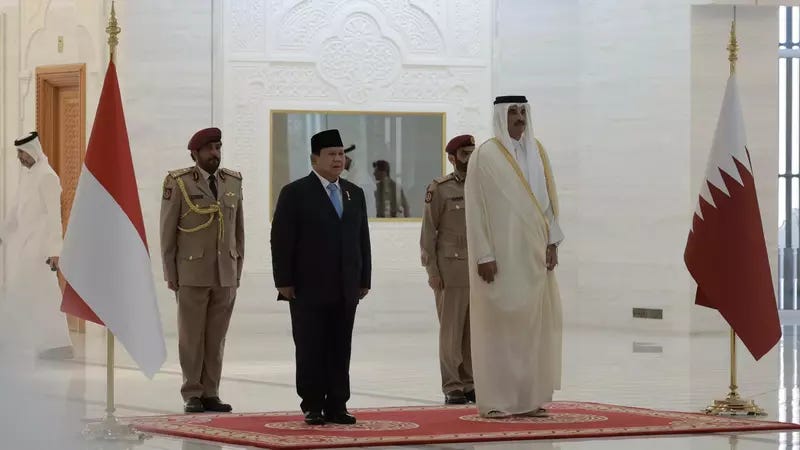Qatar Reaffirms GCC-ASEAN Commitment with $4 Billion Partnership
Deeper ties with Indonesia help Gulf countries pursue a balance of power strategy between the East and West, while undermining Iran’s international aspirations.
On 14 April 2025, Indonesian President Prabowo Subianto visited Qatar as the third stop on his Middle East tour. The visit secured a 2 billion dollar investment from Doha into Indonesia’s newly established sovereign wealth fund, Danantara Indonesia, with Qatar contributing an equal amount to form a 4 billion dollar joint fund. This development underscores the growing Gulf focus on Southeast Asia, particularly Indonesia’s potential role in an envisioned Middle East-Europe trade corridor. Through this investment, Qatar is reaffirming its desire to be a pivotal player in this transformative regional project by engaging an Asian powerhouse which is trying to get closer to MENA region. Furthermore, Gulf countries are illustrating their efforts to compete with Iran over greater influence in Asia.
GCC-ASEAN: Qatar's Role
Since their initial ASEAN-GCC Ministerial Meeting was convened in 2009 in Manama, the Gulf Cooperation Council’s relations with the Association of Southeast Asian Nations (ASEAN) have been limited, stalled by differing member state priorities and the 2017–2021 Qatar diplomatic crisis.
However, recent years have seen a significant resurgence in engagement. This increased focus is evidenced by the 2023 inaugural ASEAN-GCC Summit held in Riyadh, which adopted the ASEAN-GCC Cooperation Framework to promote collaboration in various areas, reflecting a commitment to deepen ties.
As such, Qatar is taking its East-West balancing act to Indonesia. The $2 billion investment in the Danantara Indonesia sovereign wealth fund aims to support projects in downstream industries like renewable energy, healthcare, technology, and tourism. The investment is not the first of its kind, as the emirate has previously invested in Indonesia’s energy sector, notably through QatarEnergy’s partnerships with Pertamina, and in the real estate sector, with a $18–20 billion commitment in January to develop apartments to address Indonesia’s housing shortage.
Geopolitical Undercurrents: Countering Iran and Hedging Alliances
The Qatar-Indonesia accord also reflects broader MENA-Asia realignments. Gulf states, led by Saudi Arabia, Qatar, and the UAE, are intensifying outreach to counter Iran’s growing influence in ASEAN, particularly through proxy partnerships like the Jakarta-Tehran strategic dialogue launched in 2023. Indonesia’s non-aligned foreign policy—which balances ties with Washington, Beijing, and Moscow—resonates with Gulf leaders seeking stability amid U.S. retrenchment and China’s assertiveness.
This dynamic dovetails with the Gulf’s “Asia First” strategy, epitomised by UAE-Israel normalisation deals and Saudi rapprochements with Syria and Iran. By investing in Indonesia’s critical infrastructure, Gulf states aim to secure logistical nodes and resource supply chains, echoing China’s BRI footprint but emphasising mutual sovereignty.
FTA on the Table?
At present, the only free trade agreement (FTA) in place between the Gulf Cooperation Council and a member of the Association of Southeast Asian Nations (ASEAN) is with Singapore, established in 2008. However, discussions concerning a comprehensive ASEAN-GCC FTA have persisted for over a decade. Most recently, the commitment to reinvigorate these negotiations was reaffirmed at the 2023 inaugural ASEAN-GCC Summit in Riyadh, with further momentum gained through ministerial dialogues in 2024. Concurrently, the strategic focus of Qatar, the United Arab Emirates, and Saudi Arabia on deepening economic ties with Indonesia has intensified, exemplified by significant investments and bilateral engagements. This targeted engagement could pave the way for a comprehensive Indonesia-GCC FTA, modelled on the Singapore-GCC framework.
Way Ahead
In essence, Qatar’s latest economic engagement with Indonesia not only reflects its strategic ambitions within the broader ASEAN region but also signifies a calculated response to shifting geopolitical dynamics. By leveraging robust economic partnerships and substantial financial commitments, Qatar aims to consolidate its regional influence, strengthen its strategic economic corridors, and effectively compete in the geopolitical landscape of Asia. Collectively, gulf countries are pursing a balance of power strategy trying to balance ties between the East and the West and undermine Iran’s international aspirations.




